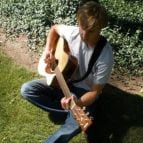 If all of your original songs are starting to sound the same, brushing up on your music theory knowledge can certainly help – particularly chord construction. Read on as Minneapolis guitar teacher Scott S. explains why…
If all of your original songs are starting to sound the same, brushing up on your music theory knowledge can certainly help – particularly chord construction. Read on as Minneapolis guitar teacher Scott S. explains why…
Songwriting is arguably one of the most difficult concepts to teach. It encompasses a broad set of skills and it’s pretty nebulous to define “good songwriting.” I have found that the individuals I teach benefit greatly from a focus on basic music theory concepts during the songwriting process. The concept I will focus on in this article is chord construction, which refers to the individual notes of a chord and its presentation within the music.
One of the things I found limiting as a young guitar player, and that I see many people struggle with, is thinking of a chord as a single unit. A chord is, in fact, a collection of several individual notes. Perceiving the chord as a single unit is limiting in two ways. The writer may avoid altering the chord in any fashion, or on the flipside will alter the chord and not understand the changes they have made. Recognizing the chord as several notes working together will open doors for the writer.
Most chords have three essential units: the root, third and fifth. On a guitar, these notes are duplicated in most open position chords. By understanding the function of each note within the chord, writers can easily pick and choose the notes they need for a given progression. The guitar songwriter will realize that in an open position C major chord, all notes are achieved twice besides G, the fifth. With this knowledge, the writer can split the chord, playing only the bottom or top half, depending on the texture they are trying to achieve.
If the writer is choosing to pick the chords, this knowledge will provide insight into how to structure the picking pattern. Sticking with the split C chord example, a guitarist choosing to use the top three strings might begin on the G string. With G being the fifth of the chord, this could create an unstable pattern. The writer who understands this will choose a more logical beginning to their picking pattern.
The second component of chord construction that I believe warrants attention in songwriting is chord alteration. I’ve worked with many young songwriters, and after they’re done playing an original excerpt for me I always ask, “How did you come up with that?” The answer is often similar: “I don’t know, I put an extra finger on the D chord and it sounded good.” Ideas like this, though they may sound beautiful, often end up unfinished. The writer does not understand the notes they have altered and therefore cannot find a direction to take their idea.
In one specific case, the individual had raised the third of the D chord, F#, to a G. In the key of D, the note G is the root of the G major chord. I suggested the student move to a G chord following their alteration of the D chord, and they moved to an open position G chord. They immediately realized that this broke the texture they had intended. The open position D chord on guitar occurs on the top four strings. I suggested to the student they find a way to voice the chord on the top strings of the guitar in order to maintain the texture. Because they had learned chord construction, they were able to create a complete G major chord by using only the top half of a bar chord, sustaining the texture they had created with the first D chord. This writer now had the next step in an idea that eventually led to a very beautiful song.
This quick story only scratches the surface of chord construction, and chord construction barely scratches the surface of the multitude of music theory concepts that are beneficial for the instrumental songwriter. In this case, knowledge is not only power, it is control. Understanding how chords are constructed gives a writer the control they need to form their ideas into complete songs. The information is easy to learn and has infinite applications. Both teachers and students should strongly consider a focus on music theory when discussing songwriting.
Like this post? Don’t miss out on any of our tips, tricks and advice! Sign up for a free email subscription and receive our updates!
You might also like…
– 3 Easy Guitar Chords for Beginners
– Ear Training Exercises: Chords and Scales
– Getting Started With Composing for Films
 Scott S. teaches songwriting and guitar lessons to students of all ages in Minneapolis, MN. His specialties include folk, acoustic, alternative rock, classic rock, punk, heavy metal, modern rock and pop styles. Scott joined the TakeLessons team in December 2012. Learn more about Scott, or search for a teacher near you!
Scott S. teaches songwriting and guitar lessons to students of all ages in Minneapolis, MN. His specialties include folk, acoustic, alternative rock, classic rock, punk, heavy metal, modern rock and pop styles. Scott joined the TakeLessons team in December 2012. Learn more about Scott, or search for a teacher near you!
Photo by gabrielsaldana
Suzy S.
